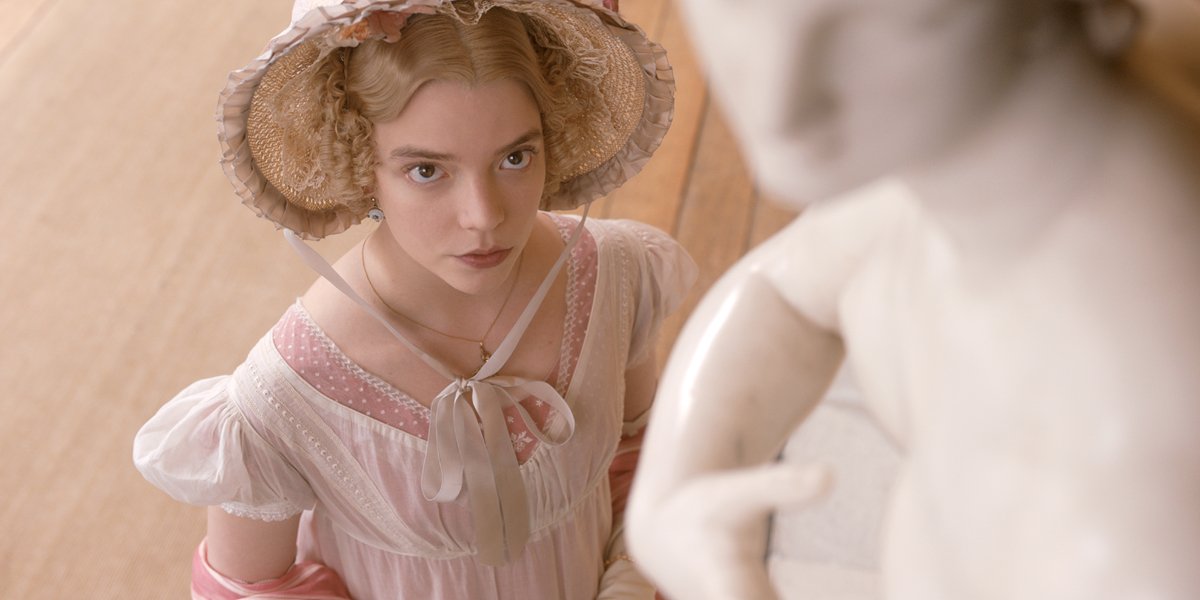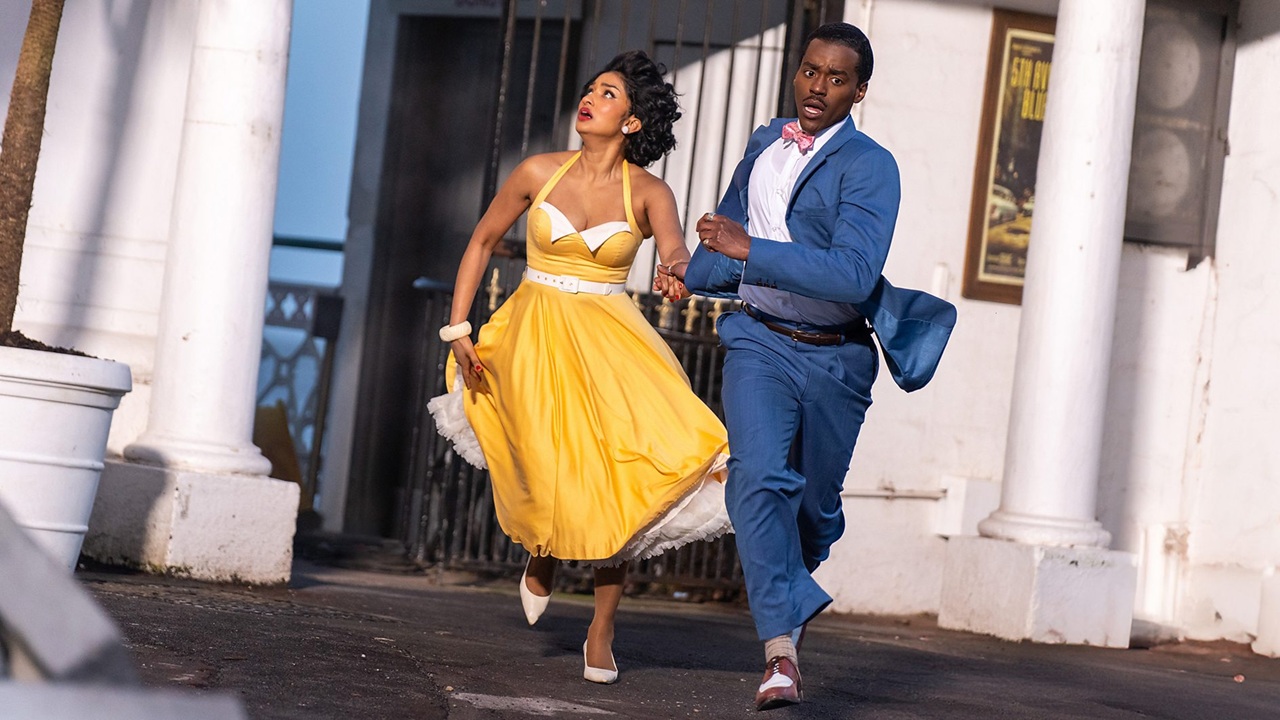In 1995, Amy Heckerling wrote and directed what is arguably the perfect adaptation of Jane Austen’s Emma. Clueless is a modernization, set in mid-‘90s Beverly Hills, and most of the character names are changed, but it’s a wonderful translation of the source material that elegantly and hilariously showcased the timelessness of Austen’s work.
From the perspective of a millennial (of which I am), Clueless is a modern classic, both as a smart literary adaptation and as a movie that encapsulates an era of pop culture. By extension, it’s become a high bar that any other Emma adaptation works to reach, and while that makes for a challenging comparison, it’s one that Autumn de Wilde’s film walks away from positively. The new interpretation stands apart as a more directly faithful cinematic take on the Jane Austen book, complete with all period dressings, and fronted by a captivating performance by Anya Taylor-Joy, and brought to life with beautiful style, it’s a delightful, funny, and sharp take on the material.
Written by Eleanor Catton, Emma transports us back to 19th century England where we are introduced to Emma Woodhouse (Anya Taylor-Joy), a spoiled young woman who lives with her emotionally and physically fragile father (Bill Nighy), and while maintaining her own independence gets a special kick out of playing matchmaker. Unfortunately, it’s a habit that results in some dire consequences when she tries to meddle in the love life of her new friend, Harriet (Mia Goth).
When Emma learns that Harriet is romantically linked with a young farmer named Robert Martin (Connor Swindells), and that a proposal is imminent, she does what she can to disrupt the relationship so that she can try and “help” her friend finder a husband of a higher class – with Emma’s step brother, George Knightley (Johnny Flynn), making his protest well known. Emma sees potential for something between Harriet and the vicar Mr. Elton (Josh O'Connor), who seems to show an interest, but in cascading, farcical, and emotional fashion, things fall apart, leaving our protagonist to try and make things right while learning some important things about herself along the way.
Emma is not only successfully laugh-out-loud funny, but earnestly emotionally.
This is very much a case of the filmmakers behind a project loving the source material and understanding that they need to get out of the way of its unfolding story, and it’s simply a brilliant experience. While always feeling entirely authentic to its time period, the banter between characters is effortlessly quick and witty, while wonders are done with well-drawn caricatures. Miranda Hart is fantastic as the trying-too-hard Miss Bates, regularly and unwittingly boring everyone around her to tears; and Bill Nighy’s Mr. Woodhouse is delightfully weird, regularly fighting a war in his own home against a persistent draft with a series of carefully aligned screens.
What’s so impressive about Emma, though, is that it’s able to make you consistently laugh out loud, but also deeply feel for the characters. There is a scene late in the film when a casually stated insult aimed at Miss Bates lands with face-melting devastation; and though we may laugh at Mr. Woodhouse’s eccentricity, the love he has for his daughter is palpable and universally relatable.
Anya Taylor-Joy continues to prove herself as an excellent young talent.
It’s an excellent cast through and through, with Mia Goth providing Harriet with a lovely naivety, and Johnny Flynn makes for a perfectly charming Mr. Knightley, but as the title suggests, Emma is Anya Taylor-Joy’s show, and she is outstanding. Thus far we have primarily watched the actress at the center of dark and horrific tales like The Witch, Split, and Thoroughbreds, but she noticeably brings a special lightness to the role that proves entirely necessary.
Emma is a fascinating character, as her egocentricity in tandem with her matchmaking creates a messy selfish altruism that is exciting to explore, and Anya Taylor-Joy does an amazing job capturing that very specific energy. Her being so self-centered doesn’t make her the easiest protagonist to fall in love with, but the journey that the actress takes with her over the course of the narrative accentuates the growth in her, and completely wins you over.
Emma is as beautiful as it is entertaining.
Making Emma all the more exciting is the fact that it marks the feature directorial debut of Autumn de Wilde. The filmmaker is far from a novice, having spent 15 years making music videos for bands and singers like Beck, The Raconteurs, and Florence + The Machine, but still it’s thrilling to see the emergence of someone in the medium with such bold style. As cold and intimidating the grand estates can be, de Wilde uncovers a homey quality that never undercuts the beauty or stateliness. The color palette at play is utterly mesmerizing, particularly an eye-popping use of yellow. It’s a stunning work visually through-and-through, and the kind of movie you could watch on mute.
Being released just a few months after Greta Gerwig’s Little Women, Emma feels like it is arriving at the exact perfect time, and deserves similar recognition for being a marvelous take on a piece of classic literature that doesn’t take the work out of its original element. Autumn de Wilde, Anya Taylor-Joy and everyone else involved with the production absolutely do right by Jane Austen, and it’s deserving of a large audience for doing so.

Eric Eisenberg is the Assistant Managing Editor at CinemaBlend. After graduating Boston University and earning a bachelor’s degree in journalism, he took a part-time job as a staff writer for CinemaBlend, and after six months was offered the opportunity to move to Los Angeles and take on a newly created West Coast Editor position. Over a decade later, he's continuing to advance his interests and expertise. In addition to conducting filmmaker interviews and contributing to the news and feature content of the site, Eric also oversees the Movie Reviews section, writes the the weekend box office report (published Sundays), and is the site's resident Stephen King expert. He has two King-related columns.











